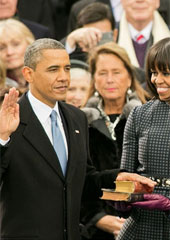An America That Can’t: A Reflection on Obama’s Second Inaugural
Does it even make sense to hold federal elections in the United States? After all, they never provide any real resolution.
January 21, 2013

U.S. politicians have long blamed Europe for being an eternal talking shop. They see it as a region where nothing gets decided. They portray everyone in Europe as just talking incessantly, if only to avoid facing reality and taking action.
There is even a name for this state of affairs — Eurosclerosis. And indeed, in the past Europeans did exhibit a prolonged tendency to talk endlessly, while real-life problems kept piling up.
No longer. We live in a very different world now. Shocked into action by the fallout from the 2007-08 financial crisis, Europeans are cleaning house rather fundamentally. They are not just touching, but also seriously tackling — and often resolving — issues long considered politically untouchable holy cows.
Europe, in short, has entered a long overdue and decisive period of remaking itself. Deeply ingrained habits, such as lax tax collection and maintaining special privileges for certain professions, are being rooted out.
Especially in the countries in Europe’s South, where reform measures were delayed for too long, there finally is a very real sense that certain traditions, while perhaps deeply ingrained, need to be done away with.
Holding on to them is not just economically nonsensical, but unsustainable and therefore self-defeating — as well as a sure-fire way to undermine one’s own nation’s future.
That is why, in countries such as Greece, Italy and Spain, there are now parliamentary majorities voting in favor of fundamental reform. A full-scale effort is underway to abandon counterproductive national practices, no matter how deeply ingrained they were.
But how about the United States, the country all of us have long viewed as pragmatic and ruthlessly reality-oriented? It loves casting itself as an agile nation of deciders, not debaters.
So much for the rhetoric. In reality, there is no longer any denying that, just as Eurosclerosis is coming to an end, the world is witnessing the emergence of a full bout of Amerosclerosis.
The problem in the United States isn’t just the result of some unfortunate temporary constellation. It is structural, rooted in a Constitution which many Americans deem so wisely constructed.
The United States has just undergone another year of a mega-election. In any other country, after such a profound and hard-fought battle, this would now be the time to declare a victor and move to reduce the immense backlog on the national agenda. Not so in the case of the United States.
A staggering $5 billion may have been spent on all the races, whether for the White House, the Senate or House of Representatives. This enormous amount of money has certainly benefited campaign consultants and strategists, as well as radio and TV station owners in the so-called battleground states.
But it has not really helped the United States to resolve anything.
Republicans are still busy asserting that they did not “lose” the elections. They are just slightly behind — 48% to 51%. In their eyes, the nation is still basically divided. Therefore, they should get to decide 50% of the agenda.
Thwarting the majority
Compare that to what happens in a real democracy. Elections there also often feature very close results. And the electorates there are divided as well. But the entire point of holding elections is to determine a winner. That winner will be given a mandate to implement the solutions they campaigned for over a specified period of time.
Not so in the United States. As the debate about the fiscal cliff, gun control and just about any other issue of any importance shows, there basically is no way by which a clear political majority can be attained at the U.S. federal level that would help resolve truly divisive matters.
Sure, Barack Obama did win reelection to the White House and the Democrats even maintained their majority in the Senate. In fact, the race for the White House is often portrayed by U.S. media as having cosmic importance, way beyond just U.S. shores.
But the curious thing is that its outcome doesn’t determine anything with any degree of finality in the United States itself. That is an especially strange outcome, given that the U.S. political system is a very strict two-party system. In such a system, it ought to be especially easy to establish a winner.
However, America’s Founding Fathers were afraid of real democracy. With their abhorrence of majority rule and a true parliamentary democracy, they put into place a political system that is long on contending political forces blocking each other — and short on delivering meaningful outcomes.
Incredibly for a nation that considers itself synonymous with modernity and that puts such a premium on always being contemporary, most Americans consider the U.S. Constitution near sacred. That is why the system of checks and balances the Founders set up in the late 18th century still reigns supreme to this day.
With its mixed model of a presidential democracy and a strong protection of the rights of strong political minorities, the United States has given itself a political structure that obfuscates a lot, but doesn’t really resolve anything.
That state of affairs – Amerosclerosis — might have been okay as long as the United States predominated in the global concert of nations.
But as has become abundantly clear, contrary to American folklore it isn’t the world that ties Gulliver down and incapacitates him. It’s Gulliver — aka the United States — that ties himself down, owing to a highly inefficient political system.
In the age of globalization, the premium for any nation is on being able to react quickly to changing circumstances. A global race is on to adjust national policies in order to reposition the country optimally for what lies ahead.
Historically speaking, it was always the United States that was the most agile in adapting to changed circumstances. No more. At the same time, U.S. politics was often extremely divisive. Witness the Civil War or the civil rights movement.
It just so happened that the structural faults of the U.S. Constitution — mainly its abhorrence of a true parliamentary democracy where a partisan majority truly gets to decide things after an election is held — were covered up handsomely.
In large part, this was due to the wealth and preeminent economic position of the United States in the world economy. The successful cover-up was also helped along by Congressional politics — read: a sufficient degree of bipartisan collaboration.
As long as the seniority principle still prevailed, committee chairmen, finding consensus among each other, could rely on the junior members voting in a preordained way. That practice, however, is now a thing of the past.
Nowadays, members of Congress, in quite an anarchistic fashion, are primarily policy entrepreneurs in their own right. Pretending to represent their constituents, they are dedicated only to the cause of their own reelection, to the point of party and country be damned.
What is astonishing about this hyper form of self-interestedness is to see how destructive it is with regard to national needs. American politicians continue to operate in their utterly self-centered, yet decorum-laden ways, while the world is passing them by.
Because of all that, we find ourselves confronted with a situation where very few nations are as dysfunctional in their domestic decision-making as the United States. That ought to give U.S. politicians plenty of reasons to reconsider their deeply ingrained ways.
That is the key question for Barack Obama’s second term — as well as for the very future of the country. As things stand, the United States is stuck in an incredible time warp.
Weighed against the thrust of American history, this state of affairs can only be considered un-American in nature. For now, it is unfortunately mostly non-Americans who see it that way.
The odds are that nothing much will happen on this front. One party, the Republicans, believe it has only has one viable political card to play — if it wants to preserve its power for as long as possible. That is to steadfastly refuse to make any changes, whether at the constitutional level, on parliamentary procedures, taxes or any other form of substance.
In reality, of course, that is not the only choice they have. Political moderation is another. But while the latter option is the rational choice, it is not the one preordained in the U.S. Constitution, with its magnificently rich rights for minorities.
Takeaways
The world no longer sees the United States as a beacon of freedom, but as a country shoving aside the responsibilities that come with modern civilization.
Americans are the new free riders as they shy back from making the investments required to bring about the global energy transformation.
"Defense" in this century, and from hereon out, has shifted from military defense to planetary defense.
Is combating climate change affordable? Given Americans' wasteful standard of living, it cannot be a matter of a lack of resources.

